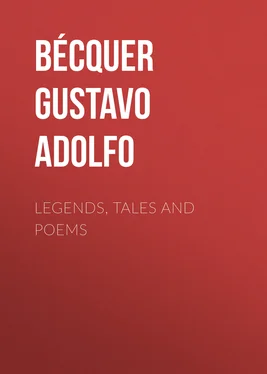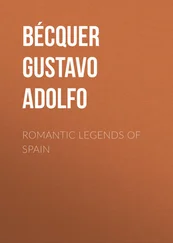Gustavo Bécquer - Legends, Tales and Poems
Здесь есть возможность читать онлайн «Gustavo Bécquer - Legends, Tales and Poems» — ознакомительный отрывок электронной книги совершенно бесплатно, а после прочтения отрывка купить полную версию. В некоторых случаях можно слушать аудио, скачать через торрент в формате fb2 и присутствует краткое содержание. Жанр: foreign_prose, literature_19, foreign_antique, на английском языке. Описание произведения, (предисловие) а так же отзывы посетителей доступны на портале библиотеки ЛибКат.
- Название:Legends, Tales and Poems
- Автор:
- Жанр:
- Год:неизвестен
- ISBN:нет данных
- Рейтинг книги:5 / 5. Голосов: 1
-
Избранное:Добавить в избранное
- Отзывы:
-
Ваша оценка:
- 100
- 1
- 2
- 3
- 4
- 5
Legends, Tales and Poems: краткое содержание, описание и аннотация
Предлагаем к чтению аннотацию, описание, краткое содержание или предисловие (зависит от того, что написал сам автор книги «Legends, Tales and Poems»). Если вы не нашли необходимую информацию о книге — напишите в комментариях, мы постараемся отыскать её.
Legends, Tales and Poems — читать онлайн ознакомительный отрывок
Ниже представлен текст книги, разбитый по страницам. Система сохранения места последней прочитанной страницы, позволяет с удобством читать онлайн бесплатно книгу «Legends, Tales and Poems», без необходимости каждый раз заново искать на чём Вы остановились. Поставьте закладку, и сможете в любой момент перейти на страницу, на которой закончили чтение.
Интервал:
Закладка:
Beautiful as Becquer's prose may be considered, however, the universal opinion is that his claim to lasting fame rests on his verse. Mrs. Humphrey Ward, in her interesting article entitled "A Spanish Romanticist,"[1] says of him: "His literary importance indeed is only now beginning to be understood. Of Gustavo Becquer we may almost say that in a generation of rhymers he alone was a poet; and now that his work is all that remains to us of his brilliant and lovable personality, he only, it seems to us, among the crowd of modern Spanish versifiers, has any claim to a European audience or any chance of living to posterity." This diatribe against the other poets of contemporary Spain may seem to us unjust; but certain it is that Becquer in the eyes of many surpasses either Nuñez de Arce or Campoamor, with whom he forms "a triumvirate that directs and condenses all the manifestations of contemporary Spanish lyrics."[2]
[Footnote 1: Macmillan's Magazine , February, 1883, p. 307.]
[Footnote 2: Blanco Garcia, op. cit. , vol. II, p. 79.]
Becquer has none of the characteristics of the Andalusian. His lyrical genius is not only at odds with that of Southern Spain, but also with his own inclination for the plastic arts, says Blanco Garcia. "How could a Seville poet, a lover of pictorial and sculptural marvels, so withdraw from the outer form as to embrace the pure idea, with that melancholy subjectivism as common in the gloomy regions bathed by the Spree as it is unknown on the banks of the Darro and Guadalquivir?"[1] The answer to the problem must be found in his lineage.
[Footnote 1: Ibid. , p. 80.]
In spite of the fascination early exercised by Julia Espin y Guillén over the young poet, it may be doubted if she can fairly be said to have been the muse of his Rimas . She doubtless inspired some of his verse; but the poet seems to sing the praises or lament the cruelty of various sweethearts. The late Don Juan Valera, who knew Gustavo well, goes so far as to say: "I venture to suspect that none of these women ever lived in the world which we all corporeally inhabit. When the mind of the poet descended to this world, he had to struggle with so much poverty, he saw himself engulfed and swallowed up by so many trials, and he was obliged to busy himself with such prosaic matters of mean and commonplace bread-winning, that he did not seek, nor would he have found had he sought them, those elegant and semi-divine women that made of him now a Romeo, now a Macías, now an Othello, and now a Pen-arch.... To enjoy or suffer really from such loves and to become ensnared therein with such rare women, Becquer lacked the time, opportunity, health, and money.... His desire for love, like the arrow of the Prince in one of the tales of the Arabian Nights, shot high over all the actual high-life and pierced the golden door of the enchanted palaces and gardens of the Fairy Paribanú, who, enraptured by him, took him for her spouse."[1] In fact Becquer, speaking of the unreality of the numerous offspring of his imagination, says in the Introduction to his works, written in June, 1868: "It costs me labor to determine what things I have dreamed and what things have happened to me. My affections are divided between the phantasms of my imagination and real personalities. My memory confuses the names and dates, of women and days that have died or passed away with the days and women that have never existed save in my mind."[2]
[Footnote 1: Florilegio de Poesías Castellanas del Siglo XIX , con introducción y notas, por Juan Valera. Madrid, 1902, vol. I, pp. 186–188.]
[Footnote 2: Obras , vol. I, p. L.]
Whatever may be one's opinion of the personality of the muse or muses of his verse, the love that Becquer celebrates is not the love of oriental song, "nor yet the brutal deification of woman represented in the songs of the Provençal Troubadours, nor even the love that inspired Herrera and Garcilaso. It is the fantastic love of the northern ballads, timid and reposeful, full of melancholy tenderness, that occupies itself in weeping and in seeking out itself rather than in pouring itself forth on external objects."[1] In this matter of lyrical subjectivism Becquer is unique, for it cannot be found in any other of the Spanish poets except such mystic writers as San Juan de la Cruz or Fray Luis de León.
[Footnote 1: Blanco Garcia, op. cit. , p. 83.]
In one of Becquer's most beautiful writings in prose, in a Prológo to a collection of Cantares by Augusto Ferran y Forniés, our author describes two kinds of poetry that present themselves to one's choice: "There is a poetry which is magnificent and sonorous, the offspring of meditation and art, which adorns itself with all the pomp of language, moves along with a cadenced majesty, speaks to the imagination, perfects its images, and leads it at will through unknown paths, beguiling with its harmony and beauty." "There is another poetry, natural, rapid, terse, which springs from the soul as an electric spark, which strikes our feelings with a word, and flees away. Bare of artificiality, free within a free form, it awakens by the aid of one kindred idea the thousand others that sleep in the bottomless ocean of fancy. The first has an acknowledged value; it is the poetry of everybody. The second lacks any absolute standard of measurement; it takes the proportions of the imagination that it impresses; it may be called the poetry of poets."[1]
[Footnote 1: Obras , vol. III, pp. 112–113.]
In this description of the short, terse, and striking compositions of his friend Ferran, Becquer has written likewise the apology for his own verse. His was a poetry of "rapid, elemental impressions." He strikes but one chord at a time on his lyre, but he leaves you thrilled. This extreme simplicity and naturalness of expression may be well illustrated by the refrain of the seventy-third poem:
¡Dios mío, qué solos
Se quedan los muertos!
His poetry has often been compared to that of Heine, whom he is said to have imitated. Becquer did not in fact read German; but in El Museo Universal , for which he was a collaborator, and in which he published his Rimas , there appeared one of the first versions of the Intermezzo ,[1] and it is not unlikely that in imitation of the Intermezzo he was led to string his Rimas like beads upon the connecting thread of a common autobiographical theme. In the seventy-six short poems that compose his Rimas , Becquer tells "a swiftly-moving, passionate story of youth, love, treachery, despair, and final submission." "The introductory poems are meant to represent a stage of absorption in the beauty and complexity of the natural world, during which the poet, conscious of his own high, incommunicable gift, by which he sees into the life of things, is conscious of an aimless fever and restlessness which is forever turning delight into weariness."[2]
[Footnote 1: Blanco Garcia, op. cit., p. 86.]
[Footnote 2: Mrs. Ward, loc. cit. , p. 316.]
Some of these poems are extremely beautiful, particularly the tenth. They form a sort of prelude to the love-story itself, which begins in our selections with the thirteenth. Not finding the realization of his ideal in art, the poet turns to love. This passion reaches its culminating point in the twenty-ninth selection, and with the thirtieth misunderstanding, dissatisfaction, and sadness begin. Despair assails him, interrupted with occasional notes of melancholy resignation, such as are so exquisitely expressed in the fifty-third poem, the best-known of all the poet's verse. With this poem the love-story proper comes to a close, and "the melancholy, no doubt more than half imaginary and poetical, of his love poems seems to broaden out into a deeper sadness embracing life as a whole, and in which disappointed passion is but one of the many elements."[1] "And, lastly, regret and passion are alike hushed in the presence of that voiceless love which shines on the face of the dead and before the eternal and tranquil slumber of the grave."[2]
Читать дальшеИнтервал:
Закладка:
Похожие книги на «Legends, Tales and Poems»
Представляем Вашему вниманию похожие книги на «Legends, Tales and Poems» списком для выбора. Мы отобрали схожую по названию и смыслу литературу в надежде предоставить читателям больше вариантов отыскать новые, интересные, ещё непрочитанные произведения.
Обсуждение, отзывы о книге «Legends, Tales and Poems» и просто собственные мнения читателей. Оставьте ваши комментарии, напишите, что Вы думаете о произведении, его смысле или главных героях. Укажите что конкретно понравилось, а что нет, и почему Вы так считаете.












